Edmund PARRY
Edmund PARRY
New South Wales Police Force
New South Wales Detective Force
Regd. # ????
Rank: Sergeant
Stations: ?, Gundagai
Service: From 5 May 1862 to 16 November 1864 = 2+ years Service
Awards: ?
Born: ? ? 1832
Died on: Wednesday 16 November 1864
Cause: Shot – Murdered
Event location: Jugiong
Age: 32
Funeral date: Saturday 19 November 1864
Funeral location:
Buried at: Gundagai Cemetery
( GPS: Lat: -35.051389
Long: 148.111944 )
Memorial location: Old Hume Highway (Riverside Drive) , Jugiong Memorial Park, Jugiong, 2726
( GPS: Lat: -34.823664
Long: 148.326496 )
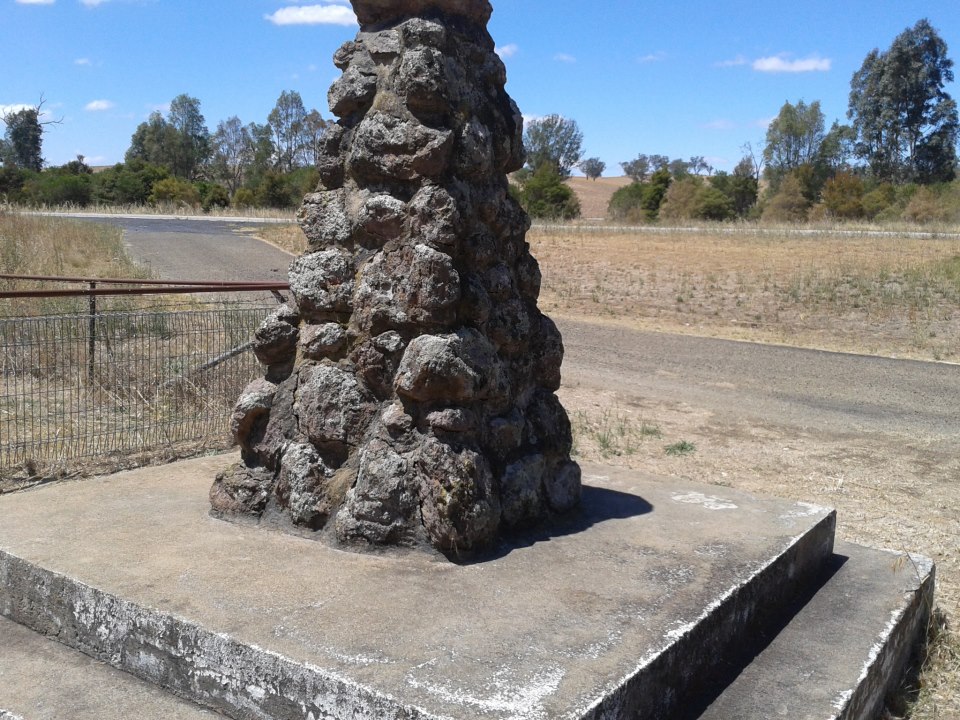
EDMUND IS mentioned on the Police Wall of Remembrance
On 16 November, 1864 Sergeant Parry ( Gundagai ), Sub Inspector O’Neill ( Gundagai ) and Constable Roche ( Yass Police ) formed the mounted police escort for the Gundagai mail coach on its journey to Yass. Roche was seated beside the coach driver, Gundagai Police Magistrate Mr Rose was inside the coach and Parry and O’Neill followed on horseback. Shortly before 3pm as the coach approached the township of Jugiong, the escort was attacked by bushrangers Hall, Dunn and Gilbert. Sub Inspector O’Neill closed with Dunn and Hall and when he had emptied his rifle he hurled the weapon at Hall, striking him on the head. He then drew his revolver and fired at Dunn. Meanwhile, Parry and Gilbert fired on each other, with the bushranger calling on the sergeant to surrender. Parry continued to fight until he was fatally shot in the head.
The Australian News for Home Readers dated ( Monday ) 19 December, 1864 carried the results of an inquest into the sergeant’s violent death, informing its readers that “An inquest was held before Mr Rose, at Jugiong, on the body of the brave sergeant of police, when the jury returned the following verdict: ‘That on the 16th day of November, in the year of our Lord 1864, at a spot about four miles to the south of Jugiong ( the Black Springs ), in the colony of New South Wales, the deceased Edmund Parry did die from the effects of a gunshot wound, at that time and in that place wickedly, maliciously, and feloniously inflicted upon him by one John Gilbert, and that two other certain persons, named Benjamin Hall and John Dunn, were then and there unlawfully aiding and abetting the said John Gilbert in so feloniously destroying the life of the said Edmund Parry.”
The murderer Gilbert and accomplice Hall would later be shot dead by police in separate incidents, while Dunn (who would murder Constable Samuel Nelson at Collector less than two months after this incident) was destined to be hanged for his crimes.
The sergeant was born in 1832 and joined the New South Wales Police Force on 5 May, 1862. At the time of his death he was stationed at Gundagai.
Sgt Parry is buried at the Gundagai cemetery.
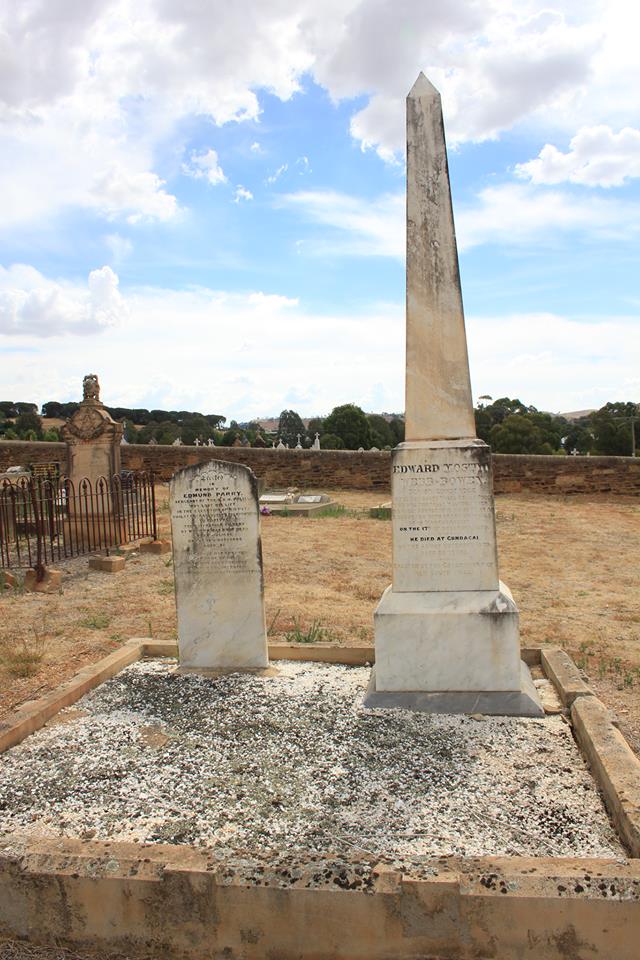
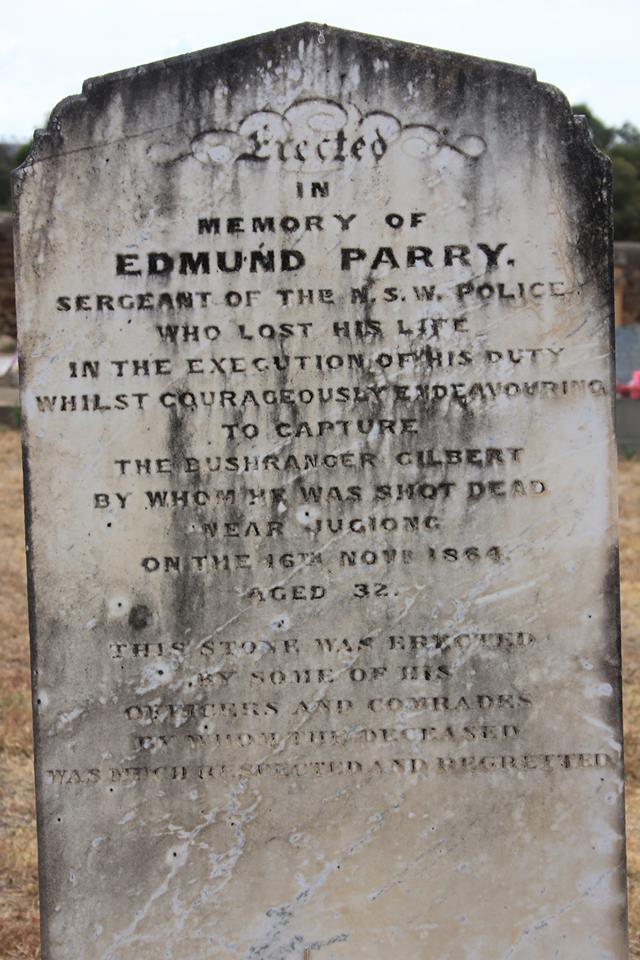
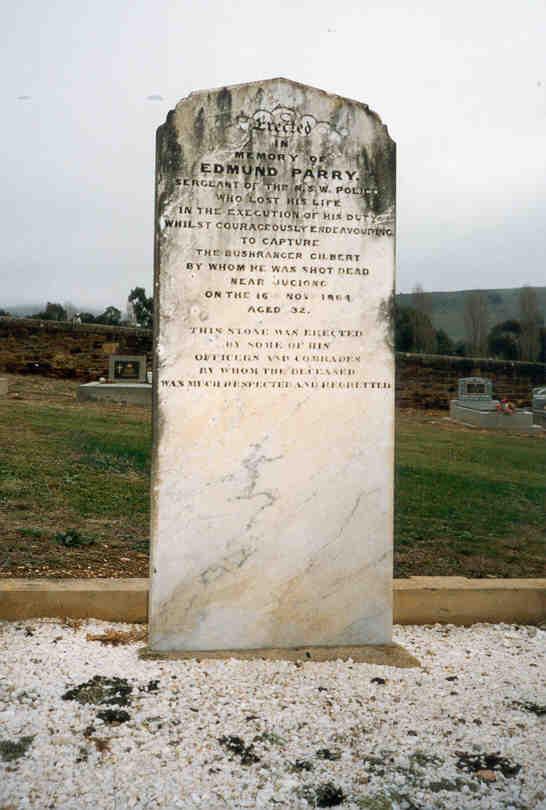
Senior Constable Wes Leseberg (NSW Police) portrays Sgt Edmund Parry in this upcoming Australian movie. Opening in December 2016.
first-look trailer for upcoming Australian bushranger film The Legend Of Ben Hall, out December 1, 2016. Start practising your pistol-twirling now…




*
GPS Co-ords 34 49 25S/148 19 35E.
*
Can I also say that the Police Station and residence at Jugiong were immaculate. Not something you see often these days but a pristine NSW Flag flying (not a tattered mess hanging from the flag pole that we see so often) and the yard and surrounds a credit to the OIC who no doubt works the majority of the time in Cootamundra or Tumut or Young or all three.
Parry, Edmund (1832–1864)
from South Australian Advertiser
On Tuesday afternoon the mail from Gundagai reached the hill at Deep Creek, about four or five miles on the Yass side of Jugiong, between 4 and 5 o’clock. Mr. Sheahan, of Jugiong, the mail contractor, and Mr. Bradbury, of Queanbeyan, were passengers by the coach, and had alighted to walk up he hill. They were some distance in advance of the coach. Mr. Sheahan was in the act of pointing out the spot where the mail was stuck-up a few weeks before, when three horsemen appeared on the top of the hill, and spreading out—one on each aide, the third in the centre of the road—they galloped towards the coach. On coming near it was noticed that each had a revolver in his hand, and the order was given by Ben Hall to “Bail up.” Hall pointed and told them to “walk up there; we have got a little township there.” After going up the hill for some distance, they were ordered to turn off to the left, and approached a spot where twelve teams were stock up, as well as a number of horsemen. The mail was then stopped. Mr. Sheahan was asked if he had any money; he replied that he had not, and they might search him if they liked. Hall declined to search, remarking that Mr. Sheahan was not a “bad sort of fellow.” Bradbury was then searched; although he handed them a cheque for one pound, stating that that was all he had, yet they examined his pockets, and asked him if he had not a watch. They got nothing from him but the cheque, and subsequently, on his telling them it was all he had to carry him on the road, the cheque was returned. Hall and his companions then took out the mail bags, six in number, and cut them all open. Before proceeding to examine the letters they asked Mr. Sheahan and Mr. Bradbury if they would have some wine. They answered “Yes,” when Hall called to one of the teamsters to “fetch over port wine.” The wine was brought, in a quart pot, and a portion of it drunk by those present. The examination of the mail-bags meanwhile proceeded, the three bushrangers sitting down on the ground with the bags before them. The letters were speedily ransacked of any bank-notes they contained, Mr. Bradbury remarking to them that they sorted the letters much quicker than was generally done in Sydney. Mr. Sheahan asked if he would be allowed to sit down, and Hall told him he could do so. Mr. Sheahan availed himself of an empty mail-bag close beside him, and noticing a large number of whole and half cheques, remarked that they were of no use to them, and asked permission to gather them up. The bushrangers consented, and Mr. Sheahan was enabled to bring on to the Yass Post Office his coat pocket as full of cheques as it would hold, as well as three bank drafts. The coach and passengers were kept an hour before they were permitted to depart, Mr. Sheahan and Mr. Bradbury gathering up the remains of the letters and placing them in a mail bag. On the bushrangers completing their work, the driver of the coach pushed on as fast as possible to Yass, and reached here only half an hour behind time. The matter was instantly reported to Sub-Inspector Brennan, who, with a couple of mounted men, took the road within half an hour.
It was fully expected in town that the mail on Wednesday would also be robbed, and the spot where it was expected to take place was mentioned to the police before they left Yass. The anticipation was realised, and even the locality surmised as the scene of the outrage proved to be the spot selected. The mail is due in Yass at eleven a.m., and as it is generally very punctual to the time, and not having arrived at a quarter to twelve, it began to be thought very likely that it had been stopped. A few minutes before twelve it was heard approaching, and much anxiety was felt to learn what had occurred to cause its detention. It was then ascertained that on the mail leaving Gundagai, Constable Roche, of the Yass police, who had gone as guard of the mail the previous day to Gundagai, and Mr. Rose, police magistrate of Gundagai, were its occupants. It was escorted by Sub-Inspector O’Neill, and Sergeant Edmund Parry, of the Gundagai police. On reaching within about four miles of Jugiong, at a place known as the Black Springs, Hall and his companions appeared from behind some rocks. The moment they were noticed a signal was made from the coach to the Sub-Inspector and Sergeant to ride up, which they at once did; and one of the bushrangers remarking that “the bobbies” were with the coach, Gilbert said “There are only two of them; come on, let us rush them.” They then darted towards the coach, and on getting near the police called out “Come on you —— wretches; we will fight you like men.” A deadly encounter followed, in which poor Parry, who acted very bravely throughout, was shot through the shoulder and dropped dead. Before, however, narrating what transpired in the encounter with the police, we may state that Hall, Gilbert, and Dunn took up their position on the road early in the day, and stuck up a large number of teams and two carts, the latter followed by 20 or 30 Chinamen. Amongst those detained were a son of Mr. Owen Ryan, of Derrengullen Creek; Mr. Hayes, wife, and young man, who were in a buggy; and others, to the number of 40 or 50. Some considerable time before the coach came up Constable McLaughlin, of the Gundagai police, approached, leading a pack horse. Gilbert rode up to him and ordered him to surrender, but he replied by a shot from his revolver, which was returned by Gilbert, who then turned his horse and rode off a short distance. Hall then took up his position and fired at the constable, who again discharged his revolver. Hall’s horse stumbled, and Dunn rode up and fired at McLaughlin. The constable discharged the six barrels of his revolver in the encounter, and then surrendered, some nine or a dozen shots having previously been fired at him by the bushrangers. Dunn remarked that one of the constable’s shots was a very good one, and they would “have it in for him” on that account.” The constable was added to the mob of captives. The coach subsequently came in sight, and the affray commenced as stated above. Constable Roche, who was on the coach armed with two large pistols, a six barrel revolver, and a carbine, is stated to have slipped off the coach when the fight began, and to have darted into the bush, carrying his firearms along with him. He did not subsequently appear on the scene. Gilbert fought with Sergeant Parry, who refused to surrender, and discharged every barrel of his revolver before he fell; Hall and Dunn attacked Sub-Inspector O’Neill, who first discharged his carbine, and then several shots from a revolver. On Parry falling dead, the Sub-Inspector surrendered. The bushrangers disarmed him, and took from him a ring and his watchchain, but we believe he was permitted to keep his watch on his informing them it had belonged to his father. The horse Mr. O’Neill rode was, however, taken, one of the bushrangers remarking it would make “a good pack-horse.” It seems singular that the driver of the coach did not take advantage of the proceedings going on to put his horses to their mettle and save the mails. This, however, he did not do, for Hall and his mates on the termination of the fight ordered Mr. Rose to throw out the bags, which the bushrangers cut open in the usual manner, and appropriated all they desired. The mail was a very heavy one, and it is supposed they secured a large amount of money. From Constable McLaughlin they took £7105; from Mr. Rose a watch and chain. We have not heard what was taken from Mr. Hayes, but he was searched; the lady who accompanied him they did not molest. Gilbert is said to have turned over poor Parry’s body, and to have remarked—”He’s got it in the cobra (head) ; I am sorry for him, as he was a game fellow.”
We may state that the bushrangers informed the police that they intended to rob the mail next day (Thursday), and told them to send as many police men as they liked, and they would fight them. On the mail reaching Yass on Wednesday night Sergeant Scully, who was in charge of the force in the absence of Sub-Inspector Brennan, at once despatched five mounted men, four of whom are connected with the Goulburn force, and had reached Yass the previous day, after eight days’ unsuccessful search for the whereabouts of the bushrangers.
The coroner’s jury returned the following verdict:—”That on the 16th day of November, in the year of our Lord, 1864, at a spot about four miles to the south of Jugiong, in the colony of New South Wales, the deceased Edmund Parry did die from the effects of a gunshot wound, at that time and in that place wickedly, maliciously, and feloniously inflicted upon him by one John Gilbert; and two other certain persons, named Benjamin Hall and John Dunn, were then and there unlawfully aiding and abetting the said John Gilbert in so feloniously destroying the life of the said Edmund Parry.”
Parry, Edmund (1832–1864)
from Portland Guardian (Vic)
Sergeant O’Neill‘s report of the recent murderous affray with Hall and his gang: Gundagai. 17th November.
“Just returned from Jugiong with the remains of Sergeant Parry. Yesterday morning early I started with Constable O’Loughlin to Jugiong, with instructions to the police station there to be at readiness to relieve Sergeant Parry and myself, who would escort the down mail to Jugiong.
At 11 a.m. Sergeant Parry and I left here riding behind the coach. Constable Roach, from Yass, was with the driver on the box set. When we got within four and a half miles of Jugiong, we there found sixty or seventy people, including Constable McLoughlin, some carriers, a lot of Chinese, and others, stuck up by Mr. Hall, Gilbert, and John Dunn.
Sergeant Parry and myself charged the bushrangers, when a deadly encounter ensured.
Ben Hall and Dunn opened fire on me and Gilbert on Parry. We all fired simultaneously several times. I had one bullet pass through the upper part of my sleeve, and one in left side of coat, neither injuring me.
Sergeant Parry was less fortunate. He received two mortal wounds, one in his left side and another in the back of his head, and he died immediately.
Constable Roach, on witnessing the engagement, took his carbine, revolver, and two old pistols with him and bolted into a paddock of Pring’s, where he took shelter. Had he stood by us Parry‘s life would have been spared, and Gilbert shot.
After emptying my revolver and rifle, I let the latter fly at Hall, striking him severely on the left side of his head. He and Dunn then had hold of my horse, and all was over—Parry shot, I a prisoner and Roach an absconder. The party having rifled the mail bags left.”
http://oa.anu.edu.au/obituary/parry-edmund-13623/text24380
GUNDAGAI. Friday, 8 p.m.
After Hall’s gang left the scene of the encounter with the mail escort, the dead body of sergeant Parry was taken on to Jugiong, where an inquest was held, Mr. Rose, district coroner, who was a passenger in the coach, was an eye-witness of the tragedy. A verdict of wilful murder was given against John Gilbert, Benjamin Hall, and John Dunn, and warrants issued for their apprehension.
The remains of Sergeant Parry was brought in a coffin to Gundagai yesterday, and buried to-day with every mark of respect and commisseration for the fate of so brave a man. All business was suspended during the day.
The encounter was witnessed by several persons, who were detained by the bushrangers, and who, as well as Mr. Rose, speak in the highest terms of the courage of sub-inspectors O’Neill and sergeant Parry.
MURDEROUS ENCOUNTER BETWEEN HALL’S GANG & THE
POLICE, AND DEATH OF SERGEANT PARRY.
IT has unhappily been our duty during the past few months to record a series of high-handed outrages and deeds of blood, which are rendering this Colony a bye-word throughout the civilised world. Our exchanges from every part of the globe contain annals of crime committed by the bushrangers of New South Wales, — crimes unparalleled save by the banditti of Italy, degrading to us as a people, the commission of which renders the Government of the Colony positively criminal for the apathetic and ineffectual efforts which they have made. The time for mincing our words has long since past. The position of affairs in the interior of New South Wales is a disgrace to any civilised community. Our legislators appear to be too much engrossed in party quarrels, and our Government in their own aggrandizement, to properly estimate the enormity of the crimes which are being daily committed in our southwestern districts, within a couple of hundred miles of the head-quarters of a police system which cost a colony containing some 350,000 inhabitants, during the past year £242,715 7s. 11d. What wonder will it be if we hear of the people whose lives and properties have been rendered insecure taking the law into their own hands, and, following the example of California, establishing Lynch Law. Much as such a system is to be deplored, we question if it would not be preferable to the present state of things.
During the past four months Morgan has murdered two police sergeants and and unoffending bushman. His immunity from arrest has probably rendered Hall and his gang from paying much regard to human life, for we find them following his example with all the recklessness which has marked Morgan’s career. The culminating act of Hall, Gilbert, and Co.’s villainous career has been that perpetrated on the 16th ultimo. On the morning of that day Hall, Gilbert, and Dunn took up their position on the road about four miles from Jugiong, and stopped all passers by. Among the number were several residents of Tumut, Mr. Johnstone, of Gundagai, about a dozen teamsters, and thirty Chinese. About noon Constable McLaughlin, going to Jugiong, was stopped by two bushrangers. Gilbert rode up and ordered him to surrender ; his reply was a shot from his revolver, which was returned by Gilbert, who then rode off a short distance. Hall then fired at the constable, who again returned it. Dunn also fired. Some of the shots cut McLaughlin’s bridle rein, and slightly wounded his horse. Having used the whole of his ammunition, and being hotly pressed, he galloped away hoping to be able to reload ; but Dunn being better mounted followed, and, firing at him, ordered him to surrender. Having no other alternative he did so, and was conducted to where the other persons were detained. On searching McLaughlin they took £7 10s. and his watch and chain, but returned the latter to him, as they admired his bravery in resisting three of them.
About three o’clock the mail from Gundagai came in sight, escorted by Sub-Inspector O’Neil and Sergeant Parry on horseback, and Constable Roach, who was seated on the box with the driver. The bushrangers rode down the hill to meet the coach, and on being perceived by Mr. Rose, Police Magistrate at Gundagai, who was a passenger, that gentleman raised his handkerchief as a signal for the police to close up, and as they did so the bushrangers turned and rode off, but seeing there were only two policemen they drew their revolvers, and rode back to meet them, screaming like madmen. The first shot fired was the signal for Constable Roach to drop from his seat and bolt into the bush, leaving O’Neil and Parry to maintain the murderous contest ; the former being opposed to Hall and Dunn, and the latter to Gilbert — the two latter fired shot for shot. Parry was first wounded in the head, but refused to surrender, and, having fired every shot in his revolver, was in the act of unslinging his carbine when Gilbert again fired. The ball entered his back on the left side, passed through his body — and the brave fellow fell from his horse a corpse. O’Neil continued fighting until his ammunition was expended, when, seeing the uselesness of prolonging the contest, he surrendered, and was taken prisoner. Dunn and Gilbert then mounted guard on the road, while Hall ransacked the mail bags ; the latter asked O’Neil where the other constable had gone to, and, on hearing he had bolted, remarked, “You should dismiss the fellow at once ; he is a coward and wretch to leave you and your mate to fight ; but I will say this for you both, you are two game men.” Hall then addressed himself to Mr. Rose, asking his name. Mr. Rose gave it, and told them in a fearless manner that he was Police Magistrate of Gundagai, to which Hall replied, “You are as bad as the —— traps.” “That may be,” said Mr. Rose, I am what I am.” After disposing of all the booty the bushrangers decamped, taking the police horses and arms. The remains of Sergeant Parry were removed to Jugiong, where an inquest was held next day by Mr. Rose. The jury returned a verdict of wilful murder against John Gilbert, Benjamin Hall, and John Dunn, against whom warrants were issued.
Sergeant Parry was formerly a member of the detective force, and during his residence in this city was remarkable for his good conduct.
The Government have recently issued a proclamation offering £1,000 reward each for Hall, Gilbert, and Dunn, and we trust that some energetic colonist may speedily enrich himself, and rid the country of one of its plague spots.
http://trove.nla.gov.au/newspaper/rendition/nla.news-article63512220.txt
Queanbeyan Age and General Advertiser
Thursday 1 December 1864, page 2
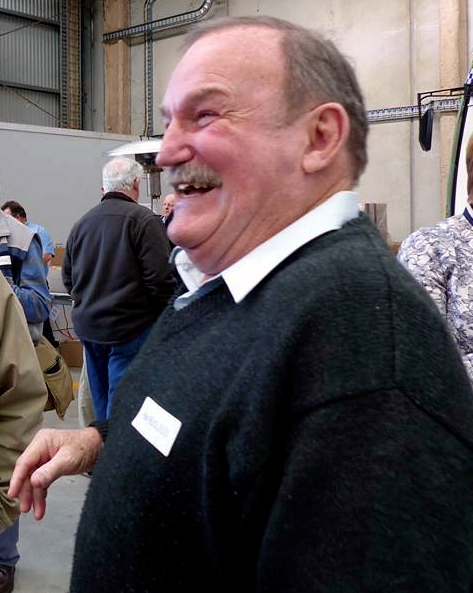

One Comment